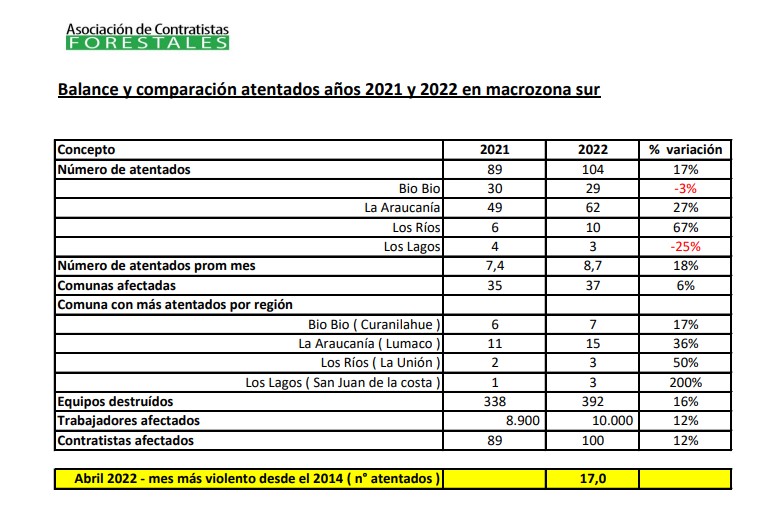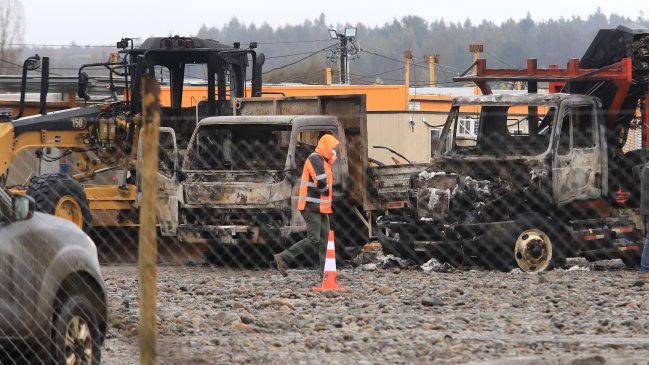The forestry industry, the third most important in the country and the foremost in this part of our territory, primarily operates between the Maule and Los Lagos regions. However, since 2014, this productive sector has been sabotaged through armed attacks on forestry operations, where high-tech equipment is burned. The harsh reality in 2022 included the murder of four forestry workers and over 20 injured in these attacks.
2022 was particularly complex for Forestry Contractors. Through their trade association, led by manager René Muñoz Klock, they presented the grim data of a year that will be remembered as the most violent and destructive. "2022 was the year with the most violent incidents, particularly in the La Araucanía and Los Ríos regions. Biobío saw a 3% decrease, and Los Lagos a 25% drop compared to last year. Overall, attacks have increased by 17% compared to 2021, and we hope to start seeing a decline in the curve because this upward trend cannot continue every year," explained Muñoz, who remembered César Millahual, Benjamín Cuevas, Alejandro Carrasco, and Segundo Catril—all forestry workers murdered at their workplaces in the forest. "They and their families are the silent witnesses of the irrational violence crushing us and of a State that has abandoned the inhabitants of this part of the country, who engage in legal and formal work. They are the martyrs of this undeclared war on the timber industry, which is out of control," he stated.
Among the figures shared, April and August stood out as the months with the most attacks since the Forestry Contractors Association began keeping records—a particularly grave situation, considering the State of Constitutional Exception in effect during that period. "The most challenging months were April with 17 violent incidents and August with 16, followed by July and November with 12 attacks each. We had four extremely violent months, making this year's attack count the highest on record, with the worst months occurring in 2022," said the manager of the Forestry Contractors Association. He added, "Regarding the affected municipalities and territories, the trend remains the same as last year: Curanilahue is the most impacted in Biobío, Lumaco in La Araucanía, La Unión in Los Ríos, and San Juan de la Costa in the Los Lagos region."
When asked about the arrest of the Llaitul clan, leaders of the Arauco Malleco Coordinating Group (CAM), between August and November, and its possible effect on the number of attacks, Muñoz noted, "There was a noticeable decline in December, not so much in November, which maintained the trend of 10 to 12 monthly attacks. But in December, we had only three, so we believe the arrest of these violent leaders did have an impact."
Destroyed Equipment and Support for Victims
Regarding the effects of these attacks on contractor companies' operations, the association stated, "On average this year, nearly nine pieces of equipment were destroyed per month—up from seven last year—which is harming investment and work, not just for contractors but also for forestry workers." This insecurity has led many to migrate to other productive sectors like construction and mining, with no contractors willing to expand their operations due to the lack of certainty.
In this context, René Muñoz explained, "For nine years, we have been constantly affected. That’s why we’re asking the State for guarantees—because we have no insurance, and what little exists is too expensive, covering less than 40% of the value of burned equipment. The danger of traveling on roads also makes the environment unlivable. Some contractors have been victims of 25 attacks—imagine their situation. Their life projects have collapsed, and morale is gone. We estimate that between 20 and 30 contractors have left, each with around 100 workers, meaning roughly 2,000 to 3,000 workers have abandoned the sector."
State Insurance as Real Support
Muñoz acknowledged that in 2022, there is interest from new authorities to solve the problem: "The issue is that this interest must translate into support for the police—not just moral but also in resources—and that’s where the problem lies. On the other hand, no one defends or supports the victims, who need reparations and assistance, an area where the State has generally failed."
According to the association, the only current support for forestry contractors affected by arson attacks comes through Sercotec funds, covering a small portion of losses and granted per incident—"not based on the number of destroyed equipment, making it unsustainable. Additionally, eligibility depends on criteria that don’t fit these types of businesses. That’s why we’re asking the State to provide insurance and real aid—not just for forestry contractors but also for farmers, merchants, and victims in general. Forestry operations without insurance are unsustainable because investing becomes too risky, with equipment costs ranging from $150,000 to $1.5 million. The best solution would be market-aligned insurance," Muñoz stated. He concluded, "In terms of violence, we hope 2022 was the peak and that 2023 will see a decline in the curve, reduced insecurity, and improved working conditions in the forests."
The photo corresponds to an attack that occurred in Arauco on July 13, 2022.







Comments (0)
No comments yet. Be the first to comment!
Leave a comment